Operation Watchtower | Chapter Six: The Suck
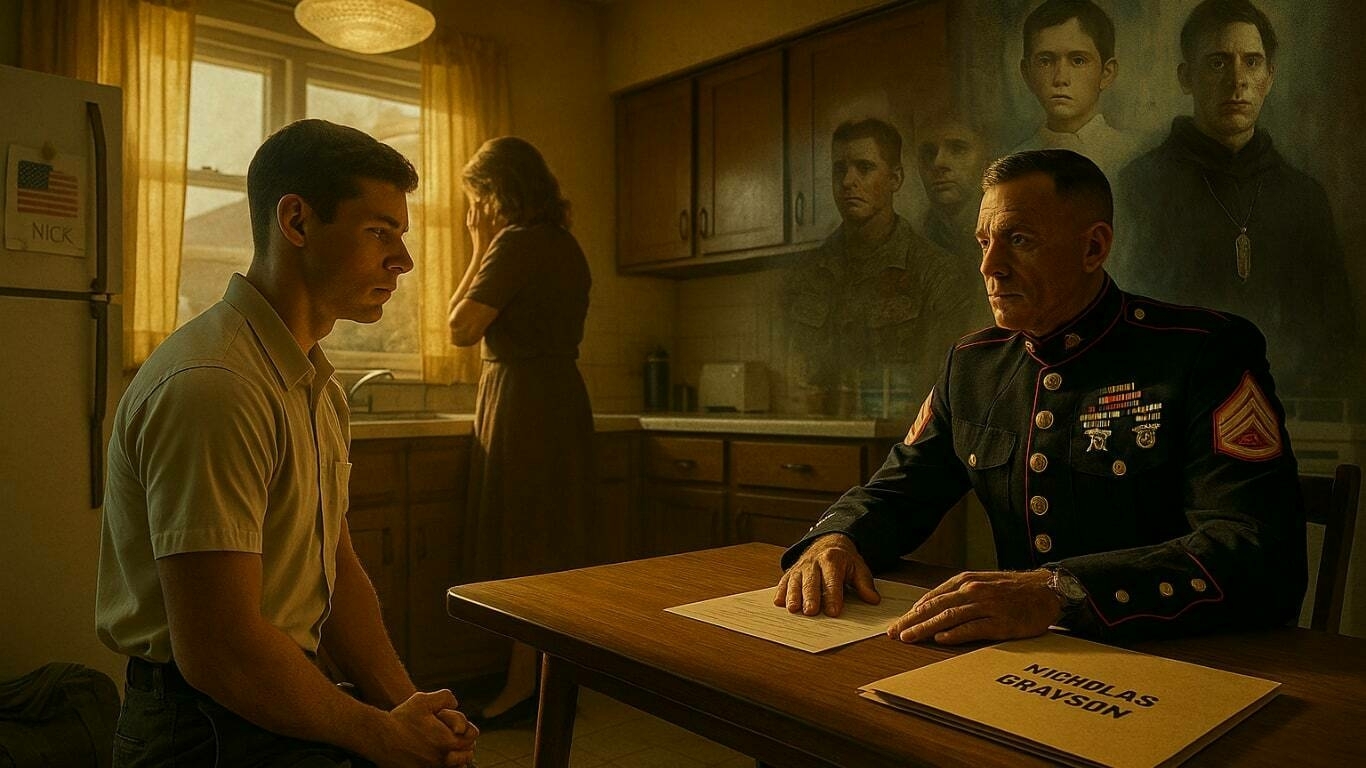
Get Right with God
Agent Nicholas Grayson. The dogs are barking. Down the street someone screams. High and broken like glass in the wind. It pulls you from the dark where you’d been dreaming. Some place black and wet. You lay there breathing. Your pants stick to you. Your cock slick with the last heat of it. The spillage cooling on your thighs. You do not move. You feel a fly crawling across your cheek, and you let it.
Then the smell comes. Old meat. Sweet and foul. You know it at once though you’d tried to forget. The bunkers. The silence beneath the earth. The heat and the bodies. What you found there. What you kept. You close your eyes but the dark only brings it closer.
You remember what came before. Before the war and the sand and the silence that followed. The day the recruiter came. The house The fan humming overhead and stirring the heat but not cooling it. The smell of coffee and dish soap. Early summer. Dust on the sill. Light slanting through the yellowed curtains.
The house is plain. Suburban. Brick with streaked siding and a porch that creaks in the heat. The lawn is cut to regulation height, edged sharp as a blade. You mow it not out of pride but discipline. A need for order. A ritual to keep the chaos at bay.
High school’s behind you. You’re still lean, all elbows and wire, but the body’s changing. You’ve taken to lifting. Running. Waking before the sun to train. Muscle and motion and meat. Steak, chicken, eggs. You eat like it’s war.
You’ve played ball—football, basketball—so you’ve got a base. But this is different. This is hunger turned inward. This is the grind. And it suits you.
He sits across from you in dress blues. Palms flat on the table. Like a man laying down cards. Staff Sergeant Clay Devlin. His eyes calm. Measuring. The kind of man who’d seen fire and never flinched from it. He speaks softly. Like a thing rehearsed. But not dishonest. Not quite.
“Ma’am, I know this ain’t easy. I get mothers in tears. Fathers who slam the door. That’s part of the job.” he says.
Your mother sits stiff-backed in her chair, hands in her lap, eyes never leaving the sergeant’s face. “Then maybe the job’s wrong.”
“Your son’s got something, ma’am. Discipline. Grit. I seen it the second he walked into my office. Most boys come in looking for glory or a way out. Nick—he just wanted purpose.”
“My son’s got purpose right here. This land. This family. Nicholas, why don’t you tell me what you told the officer here why you want to join the Marines?”
“I want a chance to serve my country and the Lord, fighting against the world’s evil.” You say. “I want to do something with my life. I want to be useful.”
“Nicholas, you’re such a smart boy. You don’t have to do this. There are so many other ways you can express your God-given talents. But your daddy was changed when he came back from the war. That’s when he started drinking, and that’s why he left us.”
She turns toward you, face flickering with pain.
“The uniform don’t know you. The flag ain’t gonna send you a letter when your body comes back zipped in a bag.”
“I have to do this,” you say. “I have to do something. You’ve told me my whole life, how much evil there is in the world. And we pray, we pray to the American flag, we pray to protect the president and the troops. And I’ve always known that that was something that called to me, and now I know it is what I’m supposed to do. I feel a calling, Mother.”
“Ma’am,” says Devlin with a gentle, practiced calm, “I’d be lying if I said it was safe. But I will tell you this: he’s got leadership potential. He’s smart. Observant. Steady under pressure. I don’t just want him in my Corps—I need men like him. Men who don’t flinch. He’ll be part of something that matters.”
“I already lost my husband to the bottle, Sergeant,” she says. ”My boy’s the last steady thing in this house.”
She stands. Walks to the sink. Her back to you. Her shoulder shake.
“Nicholas, you’re a grown man. Old enough to make your own decisions. I can’t stop you.”
She turns around and look you in the eye, and you see the pain etched on her face.
“Make sure whatever’s left of you comes back through that door one day.”
“I’ll come back to you, Mom.” You tell her.
“Ma’am, the Corps takes care of its own." Says Devlin.
Staff Sgt. Devlin turns to you. “Pickup’s Thursday. 0600 sharp.”
He nods to your mother again, respectfully.
Then he’s gone. Only the clink of the tap and the steady breathing of your mother trying not to cry.
“I’m gonna make you proud, Mom,” you say, “I’m gonna make you proud.”
You’re full of it. Hope. The real kind. The kind that hums in your bones and makes the world seem like it might open its arms instead of its teeth. For the first time you can remember, the path ahead doesn’t feel like a trap. There was a time you thought the only way to keep from falling into darkness was to put on the collar, become a priest, seal yourself off from the rot of the world.
But not now.
You suck in your gut and puff your chest. Try to look like a man. For her. To give your mother something to believe in. To ease that worry behind her eyes. It hurts to see her afraid. But you feel it in your bones—this moment. You’re strong. Invincible. She’s wrong. It’s not dangerous. Not for you.
You think of your dad.
He left when you and Marley were still small. Started fresh somewhere else. Remarried. Took in her kids. Younger than you by a stretch.
After he left, you and Marley did what you could, but it was your mother who carried the weight. Day in, day out. And though she never said it, the leaving broke something in her. Left it unfixed.
You were bitter for a time. Shut down. Quiet. But as the years passed you stepped up. Took on more. And this past year, you made your choice.
You enlisted. Marines. Not for escape, but for purpose.
Something clean. Something true.
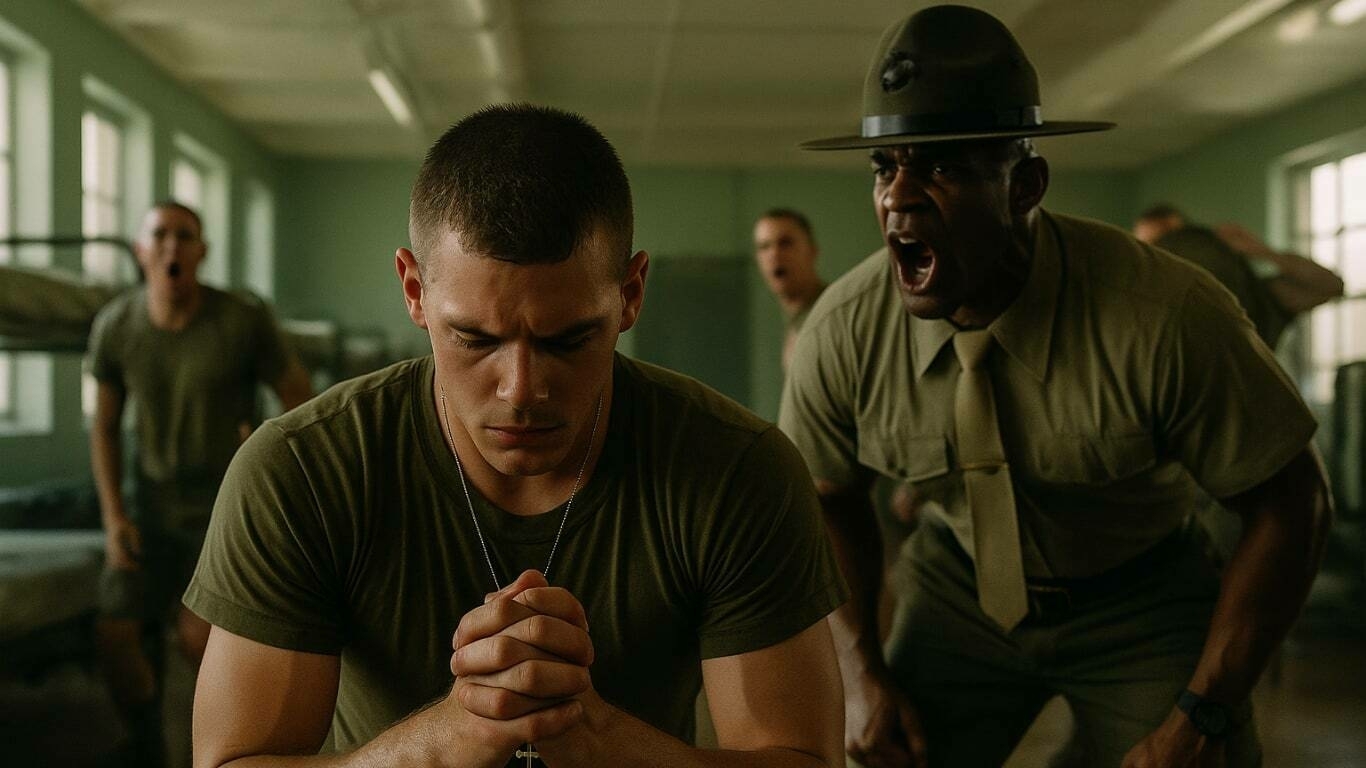
Boot Camp, MCRD San Diego
Marine Corps Recruit Depot, San Diego. Summer 1990. Day 12 of training. 0430 hours.
The lights come on with the wrath of heaven. White and sudden and unkind. A trashcan lid clangs against the concrete like a bell calling the damned to reckon. You woke hard, breath shallow, heart kicking. Above you Whitaker mutters a curse thick with sleep.
“Rise and shine, you goddamn abortions! This ain’t your fucking mama’s sewing circle! This is the United States Marine Corps!” Barks the DI.
The squad bay erupts like a nest of stirred hornets. Cots groan. Flesh slaps tile. Your body moves before thought arrives—folding sheets, lacing boots, tucking your shirt. You did not speak. You did not look. You simply obey.
The floor stinks of mildew and old socks and the thousand-foot stink of boys not yet men. The ceiling fans turn above you like the rotors of ancient machines, carving time out of the dawnless dark. Outside the sun had not yet breached the wire, but sweat already silvers your brows like a baptism in a bloodless church of war.
You worry you won’t measure up. Not the worst in the platoon, but nowhere near the top. And you reckon you won’t rest easy till you are. You don’t know the others yet. There’s laughter, sure, but it’s the kind with teeth. The kind men use to test each other. All chest and shoulders and eyes that don’t blink. It wears on you.
Their language comes hard and constant. Profanity like breath. Like ritual. You’d heard cussing in high school, but not like this. Not like the flood of filth that fills the air here. Cocksucker. Motherfucker. Faggot. Cruelty braided together in jest. Shirts are called blouses. Toilet paper’s shit paper. Words twisted. Made crude. Familiar things made strange.
You were raised Seventh-day Adventist. Raised to mind your tongue. In high school, they left you alone for it. Gave you space. Not here. Here it’s everywhere. And now you try your hand at it. Swearing. Just to belong. The words come out awkward. Clumsy The others laugh. Elbows in ribs. Grins like blades. No harm yet. But you feel the edge.
They see you pray. Morning and night. Quiet and steady. A cross beneath your shirt, warmed by your skin. Some of them pray too. But not like you. Not with fire. Not with fear.
They’ve given you names—Preacher, Padre, Choir Boy. Words meant to belittle, but not to wound. Not yet.
You miss home. Miss your mother. There are moments you regret coming here. Real fear, cold and deep. But your body changes. Hardens. The boy you were begins to vanish. And what’s left, you don’t recognize. Not yet. But it’s coming.
They tell you to embrace The Suck–the Marine Corps and its daily misery. So you embrace it.
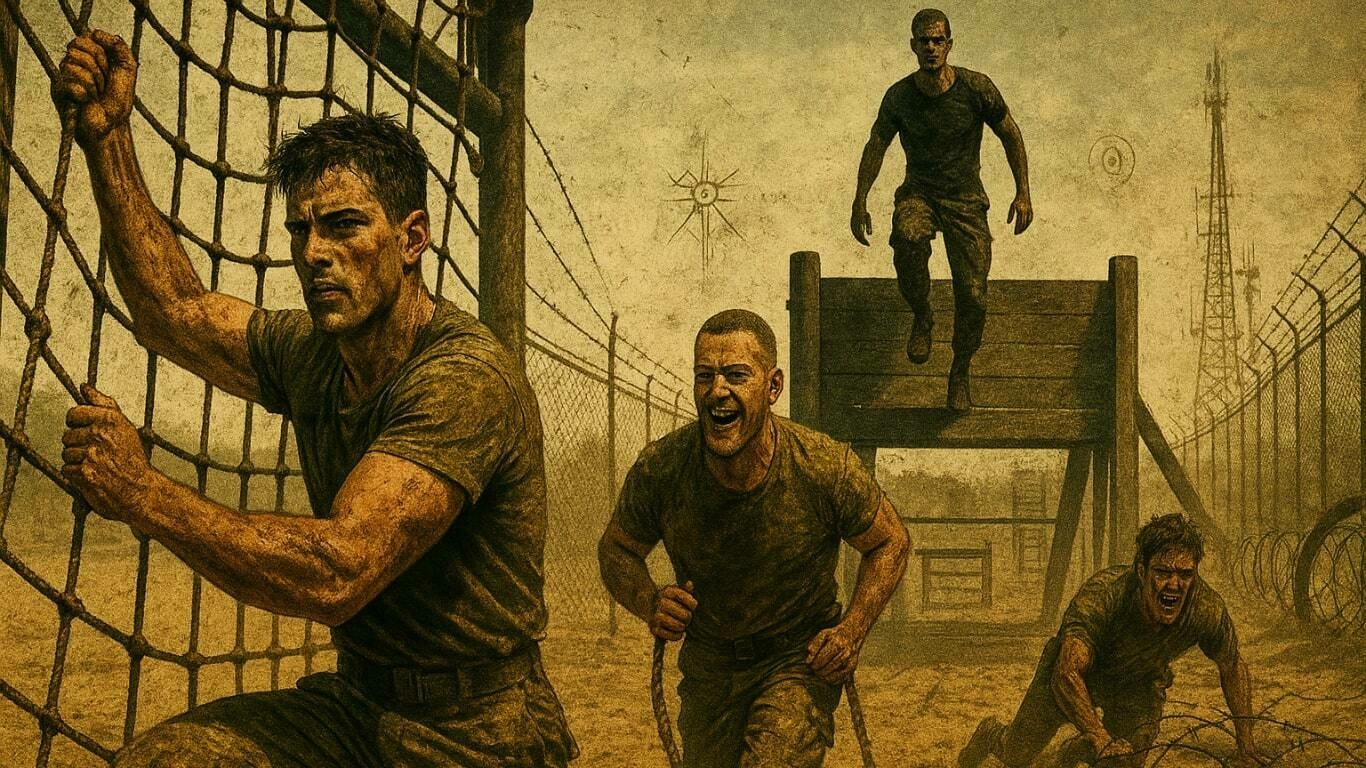
Obstacle Course – 0900 Hours
The course cuts through the base like a scar. Ropes, walls, sandpits, barbed wire—challenges carved from pain and repetition.
You pull yourself up a cargo net, arms burning. Beside you, Whittaker grunts and swears and laughs like the whole thing’s a joke.
“I swear, Nick,” he says, “if I survive this I’m gonna marry the first woman who brings me fried chicken and don’t ask no goddamn questions.”
“You’ll marry the first girl that kisses you.” You say.
You and Whittaker reach the top. From the far side of the course, Silas Mercer clears an obstacle without breaking stride. Efficient. Joyless. His face unreadable beneath the dust and sun.
Kelso lags behind. Cuts corners. Breathes through clenched teeth.
You and Whittaker are cut from different cloth. He’s loud. Loose. Laughs like a man who’s never known the weight of silence. You keep to yourself. Tight as wire. More at home with a page than with a punchline. And yet, somehow, you’re becoming friends. It could be the bunk assignments. It could be just circumstance. You’re different enough that you don’t have to pretend. There’s peace in that.
You like his lightness. The way he floats above things. It’s foreign to you, but you admire it. It makes you feel, in some quiet way, proud. Like you’ve reached across some divide. You think he’s trying to break you open, loosen you up. And maybe he’s right to try.
Mercer is something else. You’ve only known him a short while, but he carries the air of a man who’s seen too much or not enough. At first, you think there’s kinship. Same background, maybe. But the longer you’re near him, the less certain you become.
There’s something wrong beneath his skin. He’s distant, yes, but more than that—superiority. Like he’s above it all. Above you. You don’t think he came here for duty. You think he came here to kill. And not for cause. But for pleasure.
The others may be crude, loud, simple—but you can feel their hearts beating in their chests. Their souls, scuffed but intact. With Mercer, there’s only silence. Something cold. Like a man-shaped absence. Like whatever was meant to be human in him has packed up and left. Or died in place.
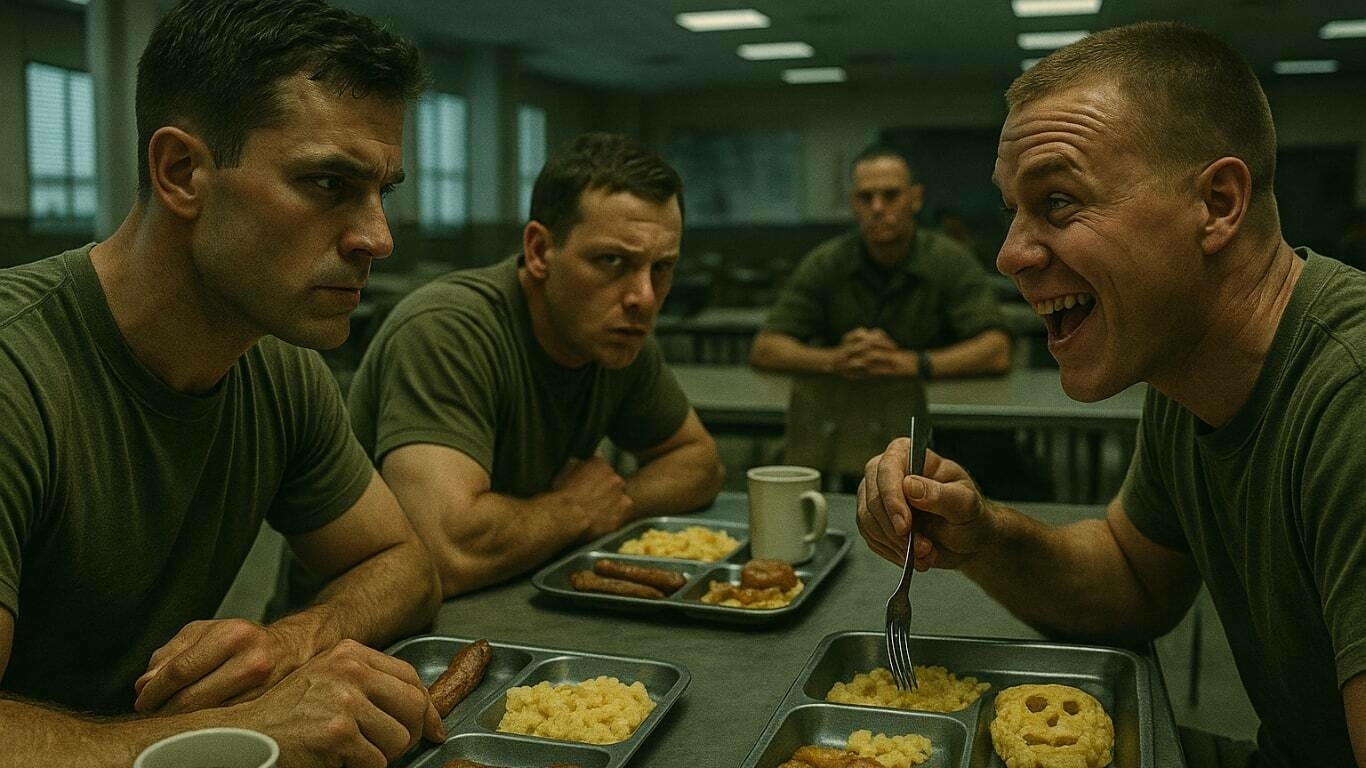
Chow Hall – 1230 Hours
The food is grey and flavorless. Eggs that bounce. Coffee that tastes like burnt rubber and battery acid.
You eat in silence. Mercer sits alone, always. Kelso goes to sit next to him, and Mercer just looks up at him with hose dead eyes of his, as if daring Kelso to sit. Kelso shrugs his shoulder and walks over to your table and sits across form you.
“Mercer watches people sleep. Did you know that?” asks Kelso.
“Well, we all can’t sleep.” You say. “It’s probably nothing.”
“I don’t know. Man, the way he looks at us, it’s like a fucking spider looking at its prey.” Says Kelso.
“I had that same thought at one point.” You say. “He does have way of looking at you, like he’s planning something, like he wants to eat your face.”
Across the room, Mercer smiles. Just slightly. Like he heard every word.
Whittaker talks as he shovels food into his mouth. “I hear there’s a circus in town. Marle Brothers Big Top. I shoulda joined the circus instead of the Corp. Food’s probably better.”
Whittaker is the yin to your yang. In the mess hall he pushes at the edges. Just enough to make you smile. When the sergeant’s back is turned he shapes faces in his food. Sometimes worse. Mashed potatoes molded into mockery. Peas for eyes. A crude cock and balls drawn with gravy like ink on a page. It’s stupid. And it’s perfect. In a place meant to grind you down, it feels like defiance. You feel it too. Like sin without the stain.
He leans over while you eat. “You gonna eat that?”
You open your mouth to answer but he’s already helped himself. Fork scraping your tray. You don’t stop him. Don’t even flinch. You let him take it. Long as he doesn’t touch the meatloaf.
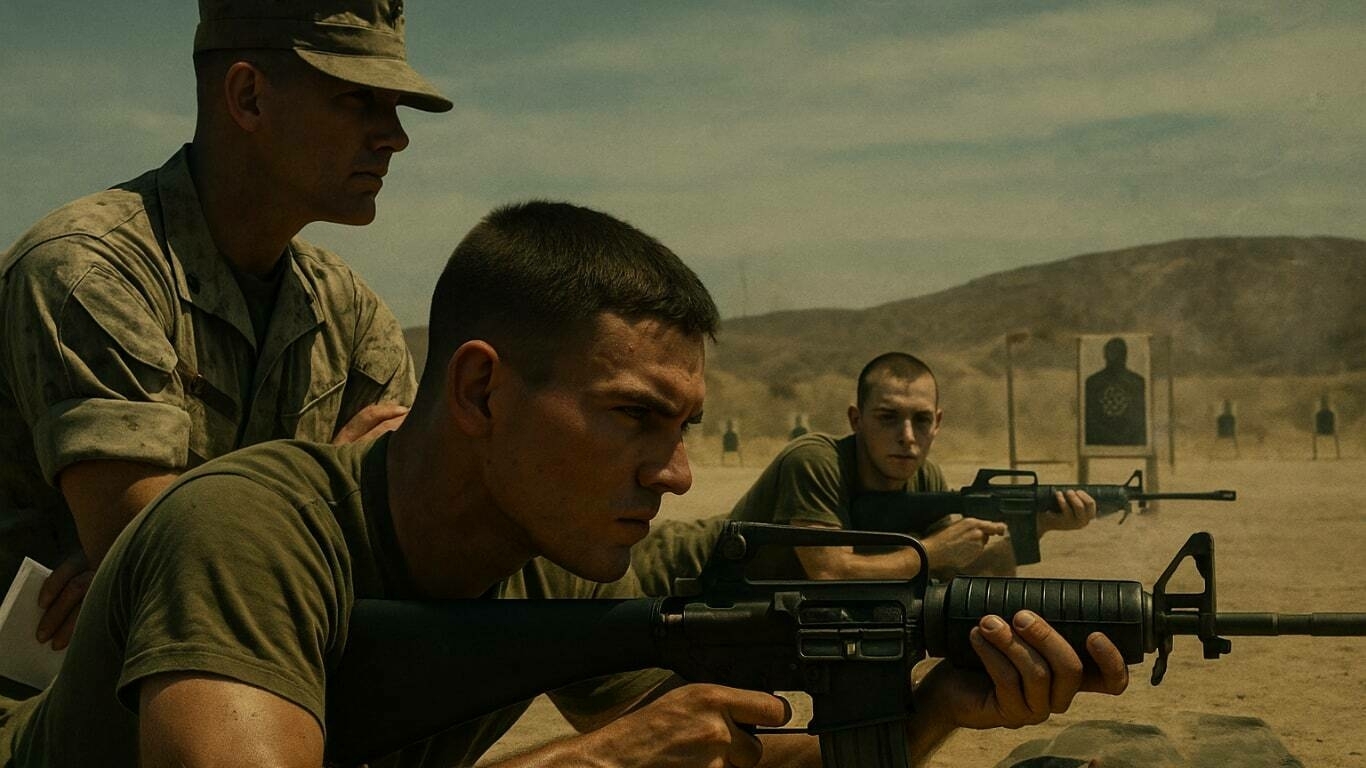
Rifle Qualification – Day 24
You lay prone. Breath held. Sight steady.
The rifle is a language now. You speak it fluently. Your grouping is tight. Your posture perfect. The instructor nods once.
Next lane over, Mercer doesn’t miss. Not once. His score is perfect, but he shoots like he’s removing something from the world. Not practicing. Purging.
After qualification, Mercer approaches you for the first time. “You shoot clean.”
“Oh, well, you know, I’m just getting the hang of it.”you tell him. “You’re not a bad shot yourself there, Mercer.”
He doesn’t acknowledge the compliment. “You need to shoot fast.” He says. “You’ll need both.”
He walks off, and for a second you watch his back and think: that’s not a man—they just gave something shaped like one a uniform.
A thought’s been creeping in lately, one you don’t want to name. But the way Mercer moves, the way he looks at people—it’s like something else is in him. Something old. Something wrong. You used to think all that talk about the devil was just metaphor, or maybe you believed it but never expected to see it. Now you’re not so sure. He feels possessed.
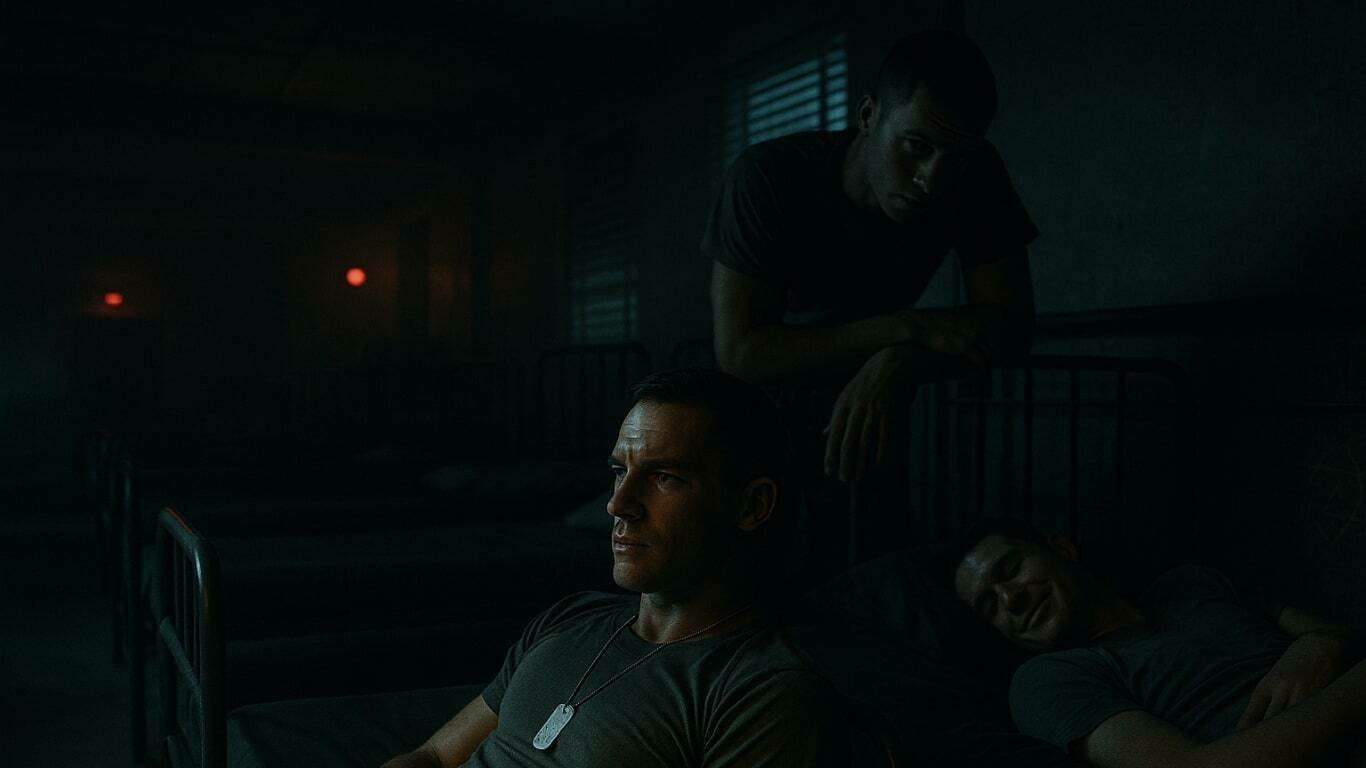
Barracks – Night
The squad bay is quiet. Except Mercer, laughing in his sleep. Soft, muffled. Like a child dreaming of pulling wings from flies.
Whittaker whispers from above. “That motherfucker’s gonna shoot somebody who ain’t wearin’ a uniform one day.”
Outside, the wind rattles the flagpole. You stare at the ceiling and do not sleep.
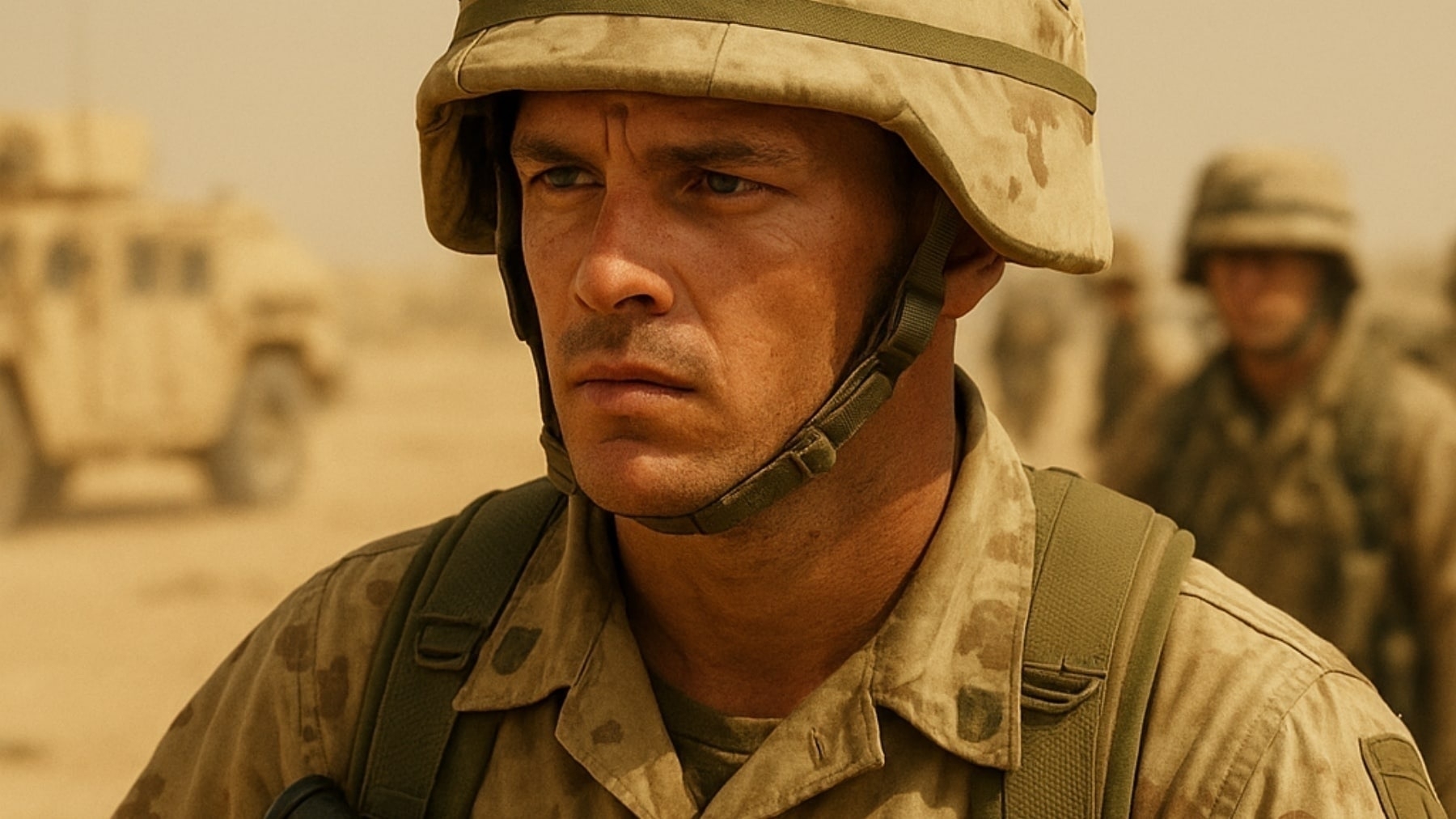
The Desert
Forward Observation Post, near Al Khafji, Northern Saudi Arabia. Three days before the ground assault begins. The air is still. The world waits to crack.
The desert in February is cold before dawn and hot by midday, and cruel no matter the hour. The sand stings the eyes and clogs the throat, whispering over the dunes like a voice without language. Everything is the color of bone. Dull. Scoured. Forgotten.
You lay flat in a shallow fighting hole cut into a ridge of shale and sand. Your rifle cradled to your chest like an infant. The lens of your scope fogs slightly with each breath. You adjust without thinking. Movements slow. Smooth. You’ve been in-country long enough now that your hands know what to do before you do.
Beside you, twenty feet away, Boyd Whitaker hunkers down behind a berm, chewing sunflower seeds and scanning the horizon through binoculars.
“Ain’t nothin’ out here but God and the people he forgot.” Says Whittaker.
“I don’t know if God forgets anyone,” you say, “but they sure have joined the ranks of the unguided, lost misfit souls.”
Whittaker grins. “That’d be us, huh?”
“We do what we can.” You say.
You both fall quiet again.
Behind you, far to the west, the artillery boys are drinking warm water and telling lies to stay warm. Up front, it’s just them. Silence, sand, and radio static. A horizon so flat it feels like the edge of the world.
In the Sandbox, they gave you a rifle and made you a sniper. Whitaker beside you as your spotter, laughing even when there was nothing to laugh about. Mercer had the same assignment, and Kelso his reluctant spotter.
As a boy you’d held rifles in your hands, your father beside you in the scrub fields behind the house. But they never sat right in your palms. Cold and alien.
The M40 is different. It speaks to you. There is a cleanness to it. A discipline. You strip it down, part by part, and learn its language. Steel and spring and breath. A thing that holds death like a secret and gives it shape.
When you shoot, you pray. Not loud. Not for show.
“Lord Jesus, God, bless this bullet.” You say.
Or, “Still my breath. Steady my hand. Let this be Your will.”
Each trigger squeeze a prayer. Each round a rosary bead. And in the scope, justice comes in small and distant shapes. And you are its vessel.
You carry your phrasebook like scripture, dog-eared and damp with sweat. As-salaamu alaikum. You say it under your breath, again and again. Peace be upon you. The words settle in your mouth like dry bread. You whisper them before you shoot. A prayer of precision. Peace by way of fire.
The Quran you keep hidden. An English translation tucked in the jacket of your Arabic manual. You study it in secret. You’re drawn to the washings, the prayers, the aching beauty of the mosques and the voices rising from minarets. There’s order in it. Cleanliness. Discipline. You admire it the way you might admire a distant star. Bright, unreachable.
But the words don’t speak to you. Not the way your own do. The text is dry. Hard. Full of rules. The tone cold. And yet the names of God comfort you. The reverence. You like how they speak the Prophet’s name with care. Peace be upon him. Always.
You haven’t bathed in a week. You drink water like a man dying but never feel clean. Your body is covered in dust and sweat and grease. The stink clings to you. You no longer notice it on yourself, only in the others. You watch the locals and envy their purity. Their white garments. Their rituals of water.
Your body has never been stronger. Thirty hours of training a week. Your muscles burn, your lungs bite, and you welcome it. The pain strips something from you. Ego. Doubt. You believe each blister, each ache, brings you closer to God’s work. To the man you’re meant to become.
In Okinawa, you studied what you could. Shinto. Zen. Watched monks in gardens of sand. They moved with silence and purpose. You tried to sit like them. Empty your mind. But prayer did not live there. No Christ. No cross. Just the breath and the void. It felt wrong. But still, you respected it.
The others went out at night. Whoring and laughing. Whittaker always asking if you’d come. Kelso too. You wanted to. Some part of you did. But you knew the shame would hollow you out. So you lied. Said there was a girl back home. There wasn’t. But your mother always said a white lie was better than a black sin.
They call you Altar Boy. Say it with a smile. Say it with a sneer. Doesn’t matter.
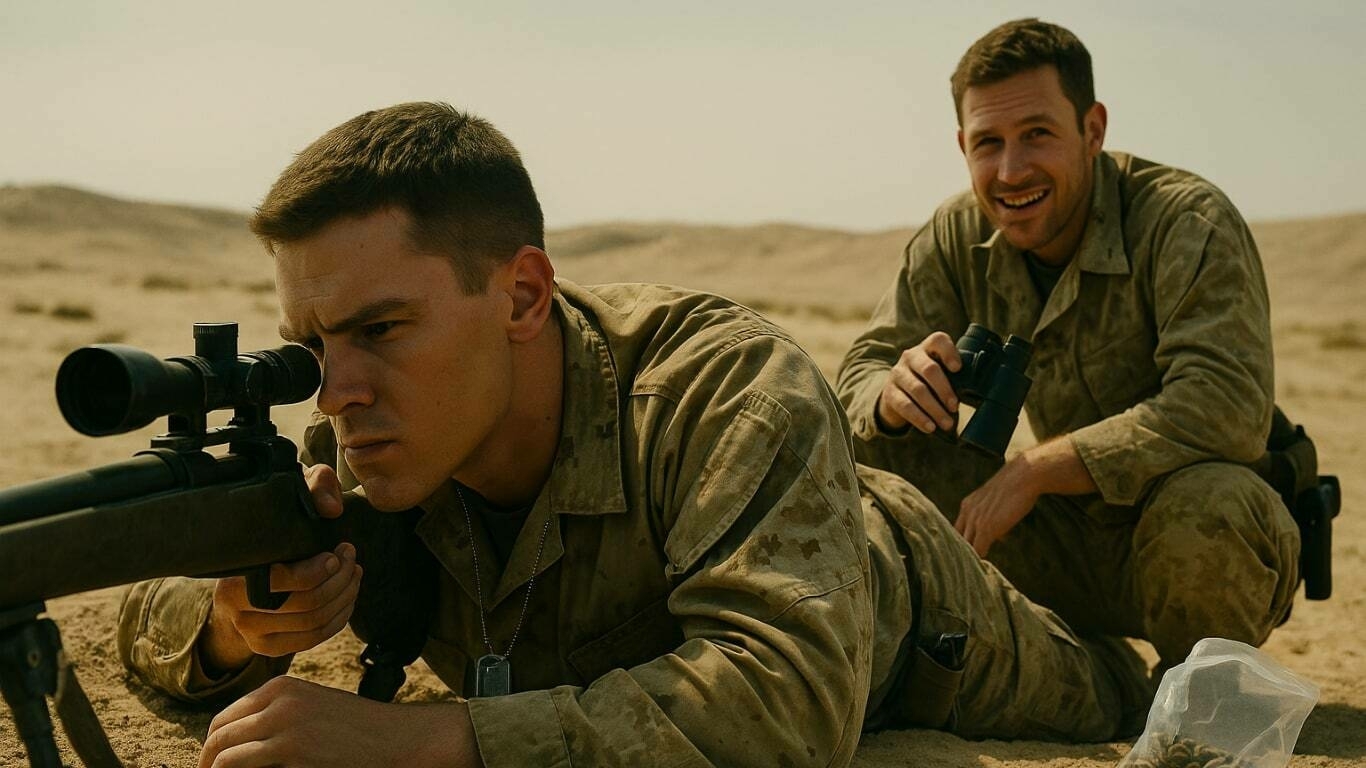
0830 Hours
Over comms, a soft click. Then the voice.
Mercer, over radio, says “Movement. Single truck. Road westbound. Two occupants.”
“Copy that.” You say.
Kelso mutters “Four-eighty meters. Civilian pattern. Possible scout vehicle.”
There’s a long pause. Then Mercer again, voice calm. “Want me to pop their teeth out or just erase the heads?”
Whittaker shoots you a look.
You mute your mic and mouth to Whittaker, “What the fuck?”
“Jesus, Silas…” says Kelso.
The Whittaker. “Rules of engagement. Confirm identification.”
Another pause. Then static.
“Roger that.” Says Mercer, like it’s nothing.
The truck disappears over a dune. Nothing happens. No shots. No confirmations. No reprimands.
You shift slightly. Your knees ache from lying still. Your right shoulder burns from holding the rifle steady for hours. Sweat cools against your lower back, then dries again. The flies come anyway. Always.
The other Marines grow restless in the lull. No shots fired. No blood drawn. They joke of blue balls and wasted rage, of needing to kill just to feel like men. But you are a sniper. And what you feel is not hunger. It is dread.
You follow orders. You understand the mission, at least in the way it’s been explained to you. The enemy is the enemy. That’s what you’re told. And most days you nod and swallow it. But some part of you holds back. You don’t see the threat with your own eyes. You are told who to hate, and you try. But there’s a stone in your gut that won’t move.
You fear the moment your finger tightens on the trigger. You fear the recoil of your soul. You fear falling apart. But more than that, you fear the absence of feeling. That you’ll kill and feel nothing. That something in you will die, quiet and final.
They say it’s a rite of passage. Mercer believes that. Believes in it like gospel. Maybe he’s right. You know you’re good with the rifle. Gifted. And a part of you—small and still—wants to know what that means. Wants to move from theory to act. Not for glory. Not for hate. Just to know.
But you want it to be clean. You want it to be holy. You want the shot to ring with purpose, like a bell in a quiet church. You want to feel God’s hand on your own. You want peace to bloom from the barrel.
The others don’t talk that way. For them it’s blood and duty and keeping the man next to you alive. Politics don’t matter. But for you they do. Or they did. You were told Saddam was a tyrant. That his people were godless or bowed to the wrong god. You believed that. Mostly.
But in the stillness, the questions come. Why would God scatter the faithful so wide? Why divide truth like that? Why make it so hard to know who’s right?
till, you press on. You cling to the thought that you serve something greater. That through the rifle and the oath, you bring order to a broken world. That the men above you—Bush, the brass, the banner—stand in the place of shepherds. That your aim is just. And that heaven watches.
100 Hours
You watch a lizard emerge from the sand. Stops. Stares. Runs back into its hole like it remembered something.
“Think we’ll be in Kuwait by March?” Asks Whittaker.
“March, maybe” you say. “I mean, we’re not moving that fast, but a lot can happen in a few weeks.”
As the words leave your mouth you hear and feel a low rumble to the south. Thunder, but not sky-born. The ground itself muttering. A column of tanks appears on the horizon, black silhouettes swimming in heat distortion.
“First wave?” Says Whittaker.
“Let’s just keep our eyes open,” you tell him.
You watch as M1 Abrams roll past like prehistoric beasts—dust trailing them in long braids. No one waves. No one smiles. The men inside are faceless behind glass and steel. You feel something sink inside you. The future rolling by, too heavy to stop.
Nightfall
The temperature plummets with the sun. Whittaker lights a cigarette. Passes the pack to you and you light your own. The glow paints your face in brief flickers, then fades. Beside Whittaker, Kelso digs into an MRE with mechanical effort. Chicken something.
“Quietly, Whittaker asks, “You’ve always been tightly wound. You always been this way?”
“I wouldn’t say I’m tightly wound.” You tell him.
Whittaker laughs, “Oh, you’re tightly wound, alright!”
“Well, nobody can be as as loose around the edges as you.”
“You got that fucking right!” He says.
“But I remember, when I was a boy, I used to joke around a lot more.”
“Oh,” he says, “what happened?”
“I don’t know. I think I just grew up, huh?”
“Well,” he says, “you sure as fuck ain’t like that boy, Mercer.”
“Well, that guy’s a psycho. I think we can all agree at this point.”
You settle in. You watch. You wait. Somewhere out there, Silas Mercer breathes like a man asleep in the middle of a fire. Somewhere else, death is on the move, quiet and barefoot.
You stare through your scope at the blank nothing of the night.
You never notice when the lizard comes back.
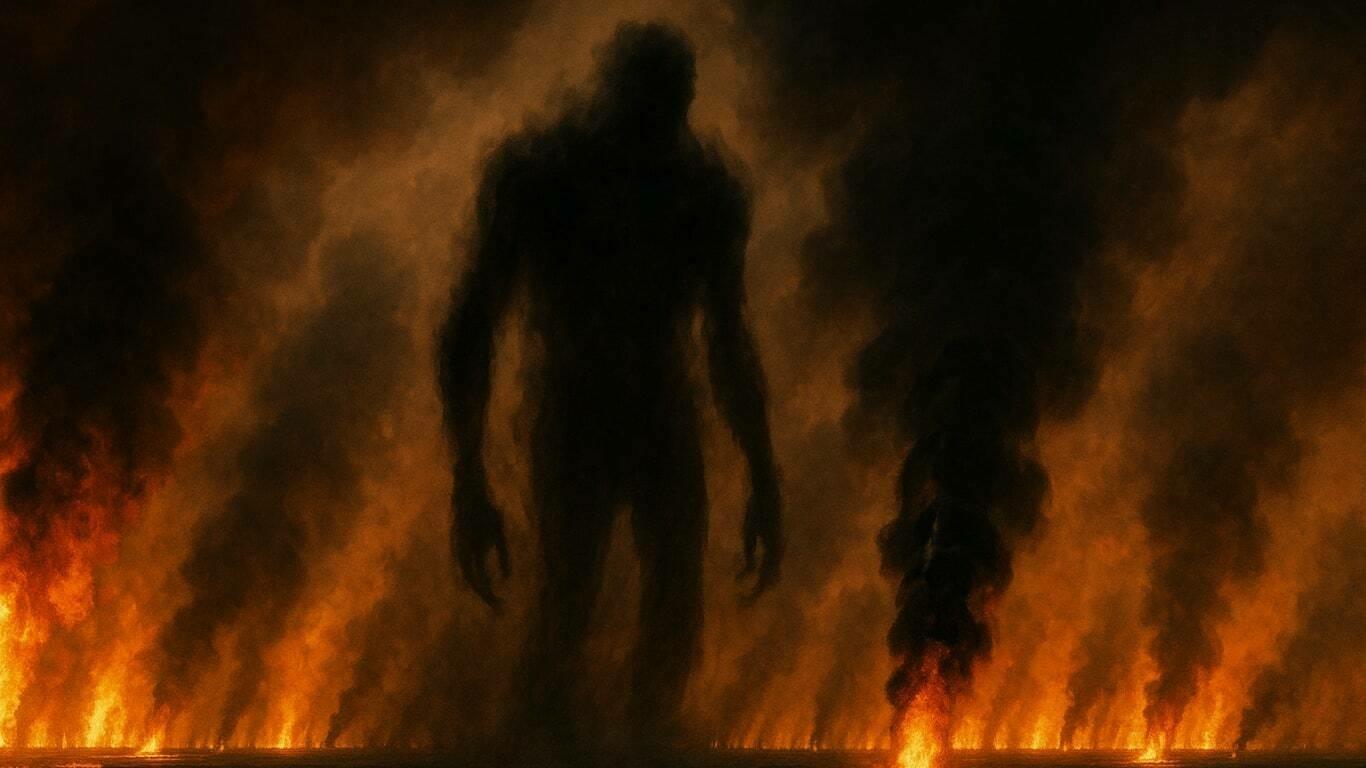
The Burning Towers
The edge of the Kuwaiti oil fields. February 1991. Days into the air campaign. Nightfall bleeding into dawn.
You march toward it like men drawn to a funeral pyre. The sky is dark as ink and thick with the breath of burning oil. It churns above you in thunderous silence, the color of old bruises, the wind carrying heat and grit and the smell of something dead and buried clawing its way back up.
You walk point. Rifle slung, boots sinking into ash-laced sand. Your flak jacket coated with soot. Your skin beneath your sleeves damp and blistered. Whitaker follows, silent now, eyes narrowed against the smoke.
The towers burn. Dozens of them. Oil derricks lit up like candles in a black cathedral. Great tongues of fire arced into the heavens and did not go out. The flames are alive. They roar without wind. They feed without mercy.
Whittaker says quietly, almost reverently “Looks like hell forgot to close the door.”
You watch one of the towers collapse in the distance, steel bones snapping under its own inferno. The earth trembles. The heat comes in pulses.
It begins to rain oil.
It feels like something hellborn is moving before your eyes, undoing the work of God in plain sight. Spoiling His creation. Tainting the grace and the bounty you were handed without asking. A ruin come to walk among the living.
You pull your goggles down to protect your eyes and take shelter behind a rusted-out personnel carrier, long since abandoned. The desert is littered with the bones of machines, some still smoldering, others twisted into sculptures of war. The bodies had mostly been cleared. Mostly.
This is more death than you’ve ever known. The ground littered with bodies. Twisted shapes in the dust. Enemy uniforms soaked dark. At first you’re gutted. Hollowed out. You start to question yourself. Your purpose. Your place in this.
But time wears things down. Even the sacred. You stop seeing faces. Stop seeing men. The dead become matter. Shapes. Chaff. Roadkill on the highway of war. You tell yourself it’s not cruelty. It’s survival. You’re not denying their humanity. You’re setting it aside. That’s the story you sell yourself, anyway.
Then there’s Mercer.
He moves among the corpses. Slow. Intent. And he begins to jab them with his bayonet. Not to check. Not from fear. Just to do it. Like he’s practicing. Like it means nothing.
Your gut turns. You’ve worked hard to find the line, to hold it steady. Mercer steps over it like it isn’t there. He treats the dead with scorn. With play.
You remember these were men. The enemy, sure. But still men. You wouldn’t want it done to Whittaker. Or to your own body. Or to your mother.
Kelso sees it. Has seen it before. Says nothing. Just looks away.
But Whitaker doesn’t.
He turns, voice sharp and loud. “Mercer, knock it the fuck off.”
You drink from your canteen. The water is hot. Tastes like metal.
And then you see it.
Movement, in the fire. Not the flicker of heatwaves or the slow roll of smoke, but a shape. Immense. Moving through the inferno as if born to it. No sound. No howl. Just the thunder of its footsteps somewhere beneath the world.
A silhouette. Towering. Vaguely human. Arms too long. Head too low. Like a man half-forgotten by the laws of nature. It walked between the flames like a dream stained in blood. It did not burn.
Whittaker smacks you on the back of your helmet and peers into the flames. “What the fuck are you looking at?”
“I thought, I thought I saw something.” You say.
You lift your goggles and rub your eyes. The shape was gone.
The derricks stand like black crucifixes in a wasteland of light and heat.
You move on. Silent. The stench follows them—crude oil and charred flesh and something else. Something older. The wind carries whispers you couldn’t place. Metal groaned like breath. Flames danced in patterns too precise to be random.
And far behind you, something walks.
You tell yourself it’s nothing. A trick of smoke. The mind reaching for shape where there is none. Like faces in the fire. That’s all. But this feels different. And it leaves a chill behind despite the heat.
You whisper a prayer. Not for courage. For mercy.
At the time you don’t name it trauma. Don’t think to. Just a vision. A sign. But later, maybe, you begin to wonder. If something in you cracked open. And if the thing that stepped through wasn’t just in the fire.
The Bunkers
Iraqi defensive line, southern border. February 1991. Day five after the ceasefire. An operation to secure and clear enemy positions. “Sanitation duty.”
They call them bunkers, but they weren’t built to protect men. They were graves waiting to be filled.
You step down into the earth, rifle low, breath held. The sun above has already burned the world to bleached ruin, but the air below was worse. Still. Stale. Thicker than oil, heavier than blood.
The flashlight on your vest cuts a pale ribbon through the dark. Cement walls slick with condensation. A map still tacked to the far wall, untouched by fire, curled at the corners like a dying leaf. Radios knocked from their cradles. Shell casings littering the floor.
And the bodies.
Six of them. Maybe more. Hard to count in the stink and the shadows. Twisted where they’d fallen. One slumped against a desk. Another face-down beside a machine gun that never fired. One sat upright, arms folded in his lap, like he was waiting for something that never came.
Their skin had turned the color of boiled leather. Eyes sunken. Lips split like old paper. And the flies—the flies never left. They moved like thoughts, crawling in and out of mouths and sockets, indifferent and eternal.
Whittaker gags behind you, retching into a sandbag.
“Ain’t natural.” He gasps. “They ain’t even been dead that long.”
Bunker clearing puts the fear of God in you. The thought of being inside one—waiting for the breach, for the fire, laying traps in the dark like some wounded animal—it chills you. And being the one sent in isn’t any better. The tunnels are tight. The air sour. Each corner feels like it could be the last. You move slow, heart thudding like a drum in a funeral march.
And yet you keep coming out. Alive. Each time the terror fades a little, worn down like old stone. You learn the rhythm of it. The terrible cadence of survival.
At the rigs it was different. The bodies there were distant. Easier to strip of meaning. To reduce to shape and mass. You learned to look without seeing. But the bunkers don’t allow that. The stink of rot is thick. Clings to your clothes. Gets in your teeth. There’s no wind down there. No smoke to blur the edges.
And these dead—they aren’t just the enemy. They’re the men you’ve been picturing for days. Studying their minds. Their habits. Their fears. When you find them broken in the dark, you can’t pretend they were never real.
You tell yourself to stay cold. To stay sharp. See them as remnants. As aftermath. But it doesn’t hold. Not for long. The weight piles up slow and quiet.
You start drinking more. Not to toast the living. But to calm the nerves. To steady the shaking hands. To drown out the dead, who wait for you in every shadow.
Against all order and code, Mercer draws a small camera from his kit. He leans into the dead man slumped at the table, throws up a peace sign like some grinning tourist, and snaps the photo. His smile is wide. Pleased. Kelso sees it and just shakes his head. No words.
But Whittaker speaks. “Mercer, what the fuck?”
He smacks the side of Mercer’s helmet. Not hard. Not soft either.
Mercer freezes. Turns slow. Cold as stone. He steps into Whittaker, chest to chest. No shouting. Just stillness. Tension like a wire drawn tight. One breath more and they’d be on each other. And you know in your gut that Mercer wouldn’t stop. Not till something broke or someone died.
That’s when it happens. Something breaks in you.
You move without thinking. Grab him by the front of his armor, fists already swinging. You aim for his face, for the soft skin behind the helmet’s edge. One blow lands. He absorbs it, shifts, returns it with force. A hard jab to your temple. You stagger. Regain. Swing again. He ducks. You hit his vest, shove him back.
Then his fist comes like a hammer. Connects clean.
And everything fades.
Dark.
You wake to Whitaker over you, slapping your face, voice sharp and distant. Kelso and a pair of grunts are holding Mercer back, his face a mask of cold judgment. No rage. Just a quiet certainty that you’ve become something beneath him. An offense. A mistake. A thing to be erased.
You lie on the bunker floor, the world ringing, your pulse pounding in your skull. Whitakker’s shouting something. You blink.
And in that moment—bleeding, broken—you see it. A small object. Black. Irregular. Obsidian, maybe. You snatch and almost swear that you felt it pulse in your glove.
Later, you burn the bunker. Didn’t say it was policy, but no one objected. Diesel pours in, lit with a match. The flames caught fast, greedy and bright. No ceremony. No prayers. Just a few seconds of silence while the wind shifted and ash rose like snow.
Whitaker sits on a ration crate, staring at nothing. Lights a cigarette and behind the smoke, he says “Don’t reckon I’ll ever forget that smell. You faced off against Mercer. I get it, but he’s gonna hold a grudge.”
“I don’t know what came over me. You say. “I lost myself there for a second. That was not like me. It’s these bunkers, just it gets to me.”
“Same.” He says. “Watch your six.”
Far behind you, the fire rages. Inside your pocket, the amulet sits like a wound that will never clot.
You don’t know why you took it. It was instinctual. The moment it touched your palm, it felt like it belonged there. Like it’d always been.
Midnight
Forward encampment. The war is over, but the fires still burn in the distance. The oil fields paint the sky in slow ruin. Most of the men sleep fitfully. Grayson does not sleep at all.
You sit alone by the burn barrel. The amulet weighs in your pocket. You haven’t taken it out since the bunker.
Footsteps crunch the gravel behind you—too slow to be an officer, too steady to be Whittaker.
He looks at you as if you are a frog splayed to a plinth.
“Don’t ever lay hands on me again, or I will kill you.”
He extends his hand and without thinking you reach for it. Muscle before mind. The old reflex. And the moment your skin meets his you’re filled with a sickness. Shame rising up like bile. The act small and simple and yet it brands you.
“You’ve been carrying it.” He says.
“Carrying what? What are you talking about?”
“I watch everything.” He says.
The wind sighs. Far off, a generator hums its broken song.
“I saw one like it. Not here. Valley in Afghanistan, before anyone said we were there. Same stone. Same shape.”
Mercer crouches by the barrel, his eyes reflecting the coals. Pale and twitchless.
“I dunno, man. Maybe it’s a key. Or a piece of something too big to carry whole. You ever feel like the sand’s whispering when no one’s around?”
You say nothing, hoping he’ll leave.
“I don’t think it talks. No. I’m saying it listens.” He says. “Men dig deep enough, they start finding things that were never buried. You brought that piece back from a place meant to be forgotten. You should bury it again. Or keep it. I don’t care. Just don’t ask it for answers.”
He walks off, boots crunching like bones in the dirt. The wind picks up again. You stay there, staring into the burn barrel as the embers pulse red and die.
You take out the amulet. Black as pitch and cut in angles that catch the firelight like blades. Obsidian maybe. Or something older. Hard to say in the glow of the dying barrel, where the coals pulse like heartbeats. The facets shift as you turn it. Or seem to. Could be a trick of the light. Could be the thing itself. Watching. Changing. Remembering its shape. You put the thing back in your pocket.
You don’t sleep that night. You don’t take the amulet out.
But you do dream.
You stand in the bunker again.
But the walls are made of meat. Pulsing. Veined. Breathing. The lights are gone, but everything glows with a dull, red rhythm like a heart too old to die. The floor sloughs underfoot. Wet. Soft. Screaming without sound.
You walk forward. Rifle in hand though you don’t remember picking it up. Ahead of you, the corpses sit upright now. Watching. Their mouths open, filled with flies. Their teeth black. The smell. That same smell.
Burned oil. Dead milk. Something older.
You try to turn but the room turns with you. The ceiling stretches into dark ribs, long and curving like a ship’s hull. Or a womb.
In the far corner, something moves.
It crawls out of the wall like it was born there. No face. No eyes. Just shape. Human in form, but wrong in proportion. Too long. Too slow. It does not walk. It arrives.
And then it speaks.
But not with sound.
The words unfurl inside his mind, syllables wet with rot:
“We. Remember. What You. Took.”
You stumble back. The amulet is in your hand now, though you never reached for it. It burns like dry ice. You open your mouth to scream.
No breath.
The shape reaches for you.
”We. Remember. The Burning.”
Suddenly, you’re outside. The oil fields again. But there are no stars. The towers are gone. Only the flames remain—suspended in the sky, unmoving. Like they’ve been nailed to the air.
And walking between them: that same silhouette. Towering. Human-but-not.
This time it turns to you.
This time you see its face.
It’s yours.
Or what you would become. Skin stretched too tight. Eyes like burnt holes in the world.
It smiles.
And you wake.
You bolt upright in your cot, soaked in sweat. The other Marines are still asleep. Whitaker turns slightly in his bunk above, mutters something about his mother, then stills.
You clutch the amulet in your fist. Blood on your palm from where it bit into him.
You look down.
The stone is warm.
Still pulsing.
You know in your gut the thing doesn’t belong to you. Never did. The amulet. Black and and wrong. You should not have taken it. You feel the pull to be rid of it like a fever rising. You think of burying it. Deep where no one will find it. Let the earth keep its secret.
But you don’t.
Something stays your hand. Not fear. Not quite. A thought like a splinter. Maybe there’s a purpose to it. Maybe someone knows what it is. What it means. Maybe it’s a key. And you need answers more than you need peace.
The dream still clings to you like wet ash. You’d call it stress, once. Chalk it up to the weight of war and the blood you carry. But Mercer’s words are still crawling through your mind, and that thing in your pocket burns like a coal.
You feel watched. Not by men. Not by God.
By something older.
You feel the edges of the world curling inward. Thin. Hellish. And you are not alone.
You wonder now if you carried something out with you.
Or if you woke it. And it followed.
The Envelope
Makeshift observation post, outskirts of Basra. Three days after the ceasefire. The wind has changed direction. Everything smells like the end of something.
You sit beneath a ripped canvas tarp stretched over steel poles driven into the sand. The wind tugs at it like fingers, but the knots hold. You stare at the horizon.
Nothing moves.
Not the tanks, not the trucks, not the birds. Not anymore.
He reach into your thigh pocket of your trousers and pull out the envelope.
It is heavy. Not thick, just… heavy. Cream-colored. Government stock. No seal but a faint watermark. Your name typed clean across the front.
Grayson, Nicholas – USMC, 1st MarDiv
You turn it over once. Then again. Then tear it open.
Inside: one sheet. Folded three times with bureaucratic precision.
UNITED STATES FEDERAL BUREAU OF INVESTIGATION LIAISON OFFICE – JOINT OPERATIONS GULF THEATER
To: Lance Corporal Nicholas Alexander Grayson
Your name has been forwarded for recommendation to the Bureau’s Special Activities Review Committee under direct advisement of General Matthias Virek, USMC Command.
Based on combat record, psychological evaluations, and command assessments, you are invited to submit yourself for screening related to field operations within the Federal Bureau.
If interested, report to provisional debrief center – U.S. Embassy, Kuwait City – no later than March 14, 0900 hours. Further instructions will follow upon interview.
This is not an offer. This is a window.
Special Agent Alton W. Rusk Bureau Liaison – CENTCOM Coordination Unit Semper Fidelis.
You read it twice. Then a third time.
Until now, your future felt unclear. You thought about another tour, maybe something else, but nothing took shape. It all felt murky. Then suddenly, it clicked into place—sharp, certain, like a lens snapping into focus. It felt obvious, inevitable, like a calling, a gift from God.
You’ve heard of General Virek but are too far down the chain to have met him. Still, somehow, he knows who you are. He recommended you for this new position.
It takes a moment to sink in.
The realization hits like you’ve been walking around naked without knowing it. Now you feel exposed. Watched. You start replaying your actions from the start of the war, wondering who’s been observing you, and what they’ve seen.
The wind tugs the paper slightly in your grip.
Behind you, Whitaker’s boots crunch in the dirt. He sits down beside you with a grunt and pulls off his helmet, setting it on his knee.
“That the one from Virek?” He asks.
“How’d you know?”
“Oh, there’s been some talk amongst the boys. I don’t rank, apparently, but the general sees something special in you. You gonna take it?”
“I can’t figure out what it is,” you say, “But yeah, I think I will take it.”
Whittaker shrugs. “Whatever they want, it’s probably the same thing we all want. Somebody who can see without blinkin’.”
Whittaker looks at you sideways. “You saw something out there, didn’t you?”
“I don’t know what you’re talking about.” You say. “I mean, we all see things out here, that’s part of the madness of this place.”
Whittaker shrugs, knows you’re holding something back.
Later that night, long after the sun buries itself behind the dunes and the fire barrels have gone cold, you fold the letter again. Put it back in the envelope. Then place the envelope beneath the amulet in your footlocker.
But you don’t lock it.
Because you know whatever came next wasn’t coming through the front door.
It was already inside.
Recruitment
U.S. Embassy, Kuwait City. March 14, 1991. Room B3 – sub-level security chamber. 0902 hours.
The room is small and ugly in the way all government rooms are. Pale green walls. Fluorescents overhead humming like insects. A metal desk bolted to the floor. No windows. One camera in the corner, blinking a red dot like it’s bored with its job.
You sits with your back straight, forearms resting on your knees. Not at ease. Not at attention. Somewhere in between.
You haven’t slept. You haven’t shaved. Your blouse still smells of sand and engine oil. You left the war six days ago and it hasn’t noticed that you’re gone.
Across from you sits Special Agent Alton W. Rusk. Civilian dress, dark blue suit, desert boots instead of Oxfords. He reads from a slim file. Turns a page. Breathes through his nose.
“You don’t talk much.” He says.
“Well, sir,” you tell him, “this Marine reserve his words for important moments and for when he has something to say.”
Rusk nods. “That’s fine. We’ve got too many talkers. Not enough listeners.”
He finally looks up.
“Lance Corporal Nicholas Alexander Grayson. Iowa. One sister. Mother, father living. High school diploma, no priors, no citations. Rifle expert, top three percent in your unit. Commendation for action during the Battle of Khafji. Citation for bravery in a chemical weapons facility near Basra, which, officially, does not exist.”
He tilts his head, studying you.
“There’s something unusual about you. You make decisions quickly. You don’t break under pressure. You take orders—but you also think two layers above what you’re told. That’s rare. What’s rarer is that you know how to bury what needs burying.”
“This interview is about options. You can go back to Iowa. Get yourself a dog. Learn to sleep again, maybe. Open a tire shop. Marry a woman who lies about how much she drinks. Or—”
He slides a manila folder across the desk. It’s heavier than it looks. Sealed. No markings.
“You open this, you’re agreeing to think differently. Act differently. Operate outside the lines you’ve been taught.”
“Sir,” you say, “you do paint an appealing alternative picture of this Marine’s future, but he is curious about what’s going on.
“Only one way to find out.” He says. “If you say no? Then you walk. We never had this meeting.”
“Do you think this Marine will regret opening this envelope? Sir?”
“If you say yes? Then the next war you fight won’t have a front line. It won’t have medals or funerals. And when you lose, you don’t die—you vanish. We don’t need heroes. We need ghosts. We need someone like you.”
Something in his voice hooks into you. Like he’s not just speaking but summoning. As if the world holds shadows deeper than men and you are meant to walk among them. To see what others can’t. To move where only ghosts go. You open the envelope.
The Dinner Table
The Grayson family kitchen. Supper just after sundown. Ceiling fan spins above them like a slow metronome.
The plates are chipped. The roast is dry. The potatoes are soft but lumpy. No one says anything about it. Your family just passes dishes, scoops servings, nods thanks without words.
The clink of silverware is the only sound for a long time. Through the open window, the cicadas buzz like static.
You sit at the head of the table, not because you asked to, but because your father wasn’t there and someone had to.
Marley sits to your right, arms tanned from the sun, her dark hair pulled back in a loose braid. She still wears the silver chain he gave her when she turned sixteen, before Kuwait, before Basra, before the bunkers.
Since you’ve been back you take to long drives. Daylight to dusk. Just to see the green again. Trees bending in the wind. The slow breath of fields alive and whole. The air smells of dirt and growth and old rain. It steadies you. You’ve no wish to see the old crowd. High school ghosts. You lift weights. You run. You stay sharp.
You buy a rifle. Practice in the back fields. Bottles and cans lined like sinners waiting judgment. Sometimes your sister comes along. You teach her to shoot. You talk less and less, but the silence between you feels full. You spend time with your mother. You all go to church.
You try speaking with the pastor. Your words falter. They live somewhere behind your teeth but won’t come forward. Still, sitting near him feels like placing your hand on a steady rock in a flood. You don’t speak your questions. Maybe because you don’t yet know them.
Most of the platoon drifts off. You don’t keep track. But Whittaker writes. Calls once in a while. Says he’s moved to Los Angeles. Says he’s joining the police force. Says he’s marrying his high school girl.
He sounds content. Whole.
You don’t know what to make of that. But it lingers. Like a note struck too low to hear but felt all the same.
Marley studies you in the soft light.
“Nick… what was it like? The war, I mean. What was it really like?”
Your mom doesn’t interrupt. Just pours herself a bit more tea, eyes lowered. The question had been coming for days. Someone had to ask it.
“What was it really like? Honestly, it just didn’t feel fair. Didn’t feel like a fair fight. Felt like a lot of decisions had been made, and we were just there to clean up a mess somebody else had made. I know it was the right thing to do, but it was messy. It was just messy. You don’t want to hear about that stuff anyway.”
Something strikes you. As a boy you’d asked your father about the war. He’d looked at you a long time and said a few words that meant nothing—answered without really answering.
Now you hear it in your own voice. The same dodge. But it also brings a flicker of understanding. For the first time, you feel a kind of kinship with him.
After dinner, you stand on the porch alone.
The stars are out, but they look wrong. Too clean. Too ordered.
Behind you, through the window, he see Marley washing dishes. See your mother drying them, back to him.
Inside was peace.
Out here—you pull the amulet from your pocket, feel the weight of it.
Out here, something is waiting.
Now
Enlisted young. The Corps. The desert. The badge. All of it drawn by some hand you’d never see till it was too late. And now. America laid open like a wound. Smoke and silence where the towers once stood. And you laid out on this cot in a safe house they said was clean. The girl you saved, on the other side of the blue tarp that separates the two of you, is still working on her laptop.
The stink hits you again. Meat long gone. Sour. Once it turned your gut. Now it’s just a part of the world. Like dust. Like rust. Like grief.
The dogs still barking. Something feral in it. But the screaming has gone out like a fire in wet wood. And from outside, Rocío’s voice: “What the fuck was that?”
You tell yourself: Get up, Marine. Check the wire.
You rise. Slow. The blanket clings and the skin pulls and your pants hang heavy and wet. You don’t look down. You know. You remember the dream. The corn. The thing that rose up from between the rows and kissed you with a mouth full of ruin. A tongue like a snake, slick and choking.
There something’s seriously wrong with me, you think. Something’s desperately wrong with my soul. I made a mistake. At some point I went wrong. I need to get right with God.
You steady yourself. The safe house is dark and humming with static. And there it is. A few feet off. Small. Still.
Takes you a moment to understand what you are seeing.
Then it doesn’t.
The body of an infant. Dead. Flesh rotting. Dissolving into the concrete floor like wax under fire. Skin bubbling. Eyes gone. No mouth to cry with.
And in your chest, something breaks. Quietly.